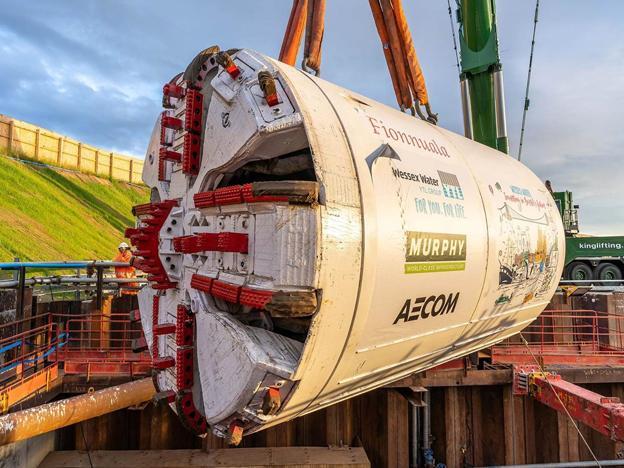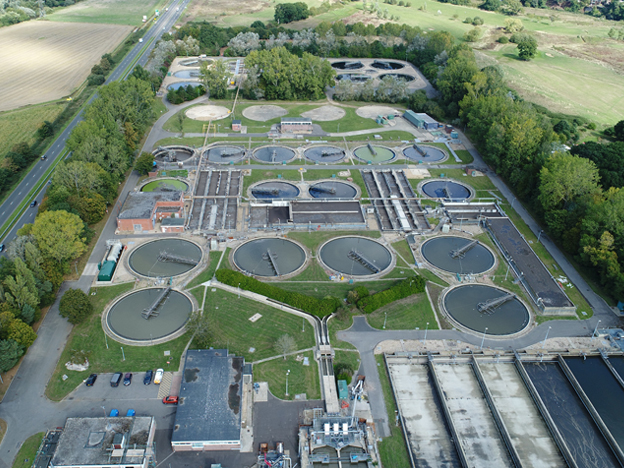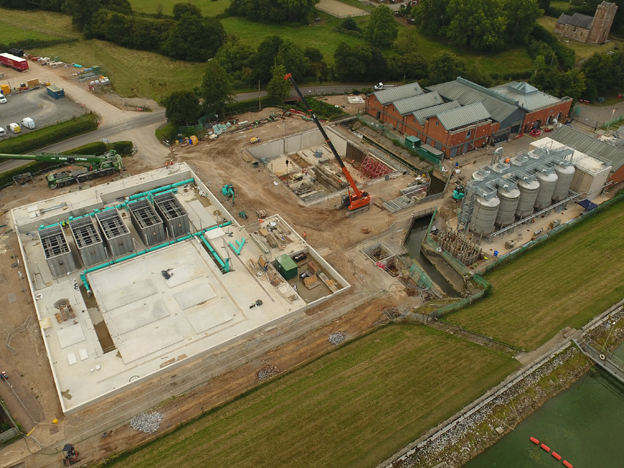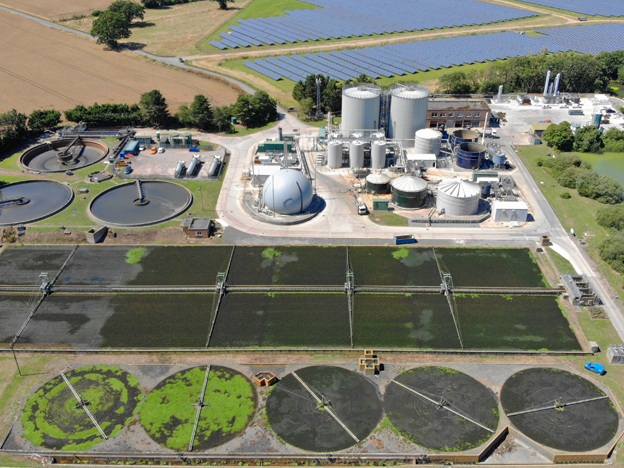Investing across the region
We’re investing £1.4billion between 2020 and 2025 to upgrade our infrastructure, accommodate new growth and development across our region, and improve our local water environment.
These are some of the recent projects our teams have been working on in Bristol, Dorset, Somerset and Wiltshire.
Building a "super sewer" in North Bristol
A large tunnelling machine has completed a five-and-a-half-kilometre journey deep under the streets of Bristol to create our new super sewer that will support population growth in the city for decades to come.
The specialist machine, which has worked its way underground from Lawrence Weston to Almondsbury, was specifically chosen to minimise traffic disruption and environmental impact that would have been caused if open trenches were dug to lay the sewer.
After starting its journey in June 2020, the machine has travelled deep underneath built-up areas of Henbury, the former Filton Airfield, Cribbs Causeway and the M5 motorway, all with minimal disturbances to residents, businesses and motorists. Its final destination was the Bristol Golf Club in Almondsbury, where a reception pit was excavated to remove it.
The new sewer is a £55million investment to support ongoing and new development and minimise the risk of flooding and the use of storm overflows during wet weather.
The next phase of the project now that the tunnel is complete is to fit out the new sewer with mechanical and electrical equipment, before removing the various construction sites in Lawrence Weston, Henbury, Filton and the golf club and reinstating the areas back to normal. The project is expected to be fully completed by Autumn 2022.


Water recycling centre upgrades in Dorset
A huge part of our job at Wessex Water is to treat wastewater so it can be safely released back into the environment. It’s important that this treated wastewater – or final effluent as we refer to it – meets the highest standards and, over time, our water recycling sites require upgrades to maintain these standards.
New development and population growth across the region means an increase in the sewage we need to treat and therefore an increase in the substances we need to remove from the sewage.
One of these important substances is phosphorus – a mineral that is found in all known forms of life and for us humans, it’s essential for the growth of strong and healthy bones and other parts of our bodies. It occurs naturally in human waste, so a lot of it ends up in our water recycling sites.
Too much phosphorus in the treated wastewater that we release back into our rivers can be a problem, as excess amounts cause algae to grow too fast. This has a negative impact on the surrounding ecosystem and wildlife, as it basically reduces the oxygen levels in the river.
This is why between 2020 and 2025 we are investing more than £54million in upgrades to our water recycling sites in Dorset with improved phosphorus-removal technology, allowing us to keep up with the demands of a growing population and maintain our high waste treatment standards for the benefit of our local environment.
Rebuilding Durleigh water treatment centre
The rebuild of the Durleigh water treatment centre near Bridgwater is the largest single-value scheme delivered by our Engineering and Sustainable Delivery (ESD) department.
As part of our long-term water supply strategy for Somerset, the £50million project started in 2019 to improve the centre, which had come to the end of its operational life and needed extensive reconstruction.
Due to be finalised this year, a programme of major groundworks has been completed followed by construction of new buildings and specialist equipment.
The improved processes for water treatment mean it will continue to deliver the highest quality drinking water to a population of 44,500.
Two new wetland habitats at the head of Durleigh reservoir – located west of the treatment centre – were also designed to filter silt and coarse sediment, helping to improve the raw water quality entering the reservoir.
Our catchment delivery team are also working with local farmers to reduce pesticides and silt entering the watercourse, while the habitats have also improved biodiversity, such as new amphibians, dragonflies and wildflowers.


Improving Trowbridge water recycling centre
We have already invested more than £15million in Wiltshire to improve our water recycling centres to remove increasing levels of nutrients from sewage, reduce their impacts on the environment and improve river quality.
Now around £7million is being spent on upgrading the centre at Trowbridge, one of the largest in Wiltshire, which handles domestic and commercial sewage from the surrounding area and satellite centres.
The improvements will remove phosphorus, which comes from sewage treatment and other sources like agriculture and urban run-off, and ensure these processes continue to meet high water quality standards by the end of 2022.
These phosphates can cause excessive algae growth and reduced oxygen levels, which can upset the delicate balance of life in our rivers.
We’re committed to providing sustainable methods of treating wastewater by removing phosphorus and are investing record amounts in upgrading treatment works to improve river water quality, as well as reducing the amount of water we extract from rivers and catchments to keep flows sufficient for ecology and enable habitats to thrive.
Working with farmers on a collaborative approach to help with the quality of water in our rivers, we are also monitoring three quarters of storm overflows in our region, rising to 100 per cent by 2023, to gain a better understanding of when they operate and their impact on river water quality.
Reducing storm overflows
Storm overflows prevent properties from flooding during intense rainfall by releasing diluted storm sewage into rivers or the sea.
Although they have always been a part of our sewer network, we are aware of our customers’ increasing concern about the impact they have on our waterways.
We’re committed to completely eliminating the discharge of untreated sewage into rivers and seas, so we're spending £3 million every month to reduce storm overflows, part of a £150 million investment programme between 2020 and 2025.
Find out more on our Storm overflows page.

